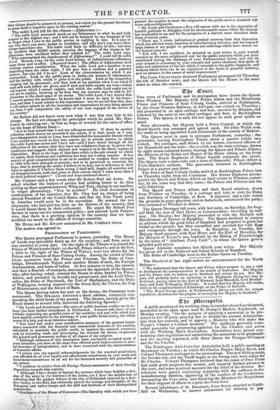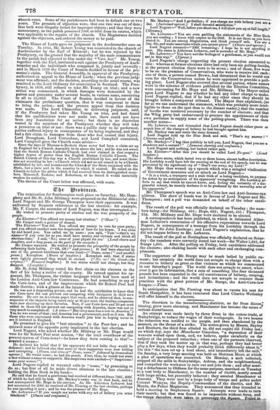Zbe fEletropolis.
A public meeting of the working class, in number about four thousand, assembled in the open space near St. George's Market, Southwark, on Monday evening, "for the purpose of adopting a memorial to be pre- sented to her Majesty, praying her to dismiss the present Administra- tion from her councils, and to appoint a Ministry who will make the People's Charter a Cabinet measure." The speakers generally coun- selled peaceable but persevering agitation for the Charter, and union with the Working Men's Association. Resolutions were passed con- demning class-legislation and authorizing the memorial to be presented: and the meeting separated, with three cheers for Feargus O'Connor and for the Charter.
The Paddington Anti-Corn-law Association held a public meeting at Bayswater on Tuesday ; at which Sir Charles Napier, Major Revel, and Colonel Thompson, took part in the proceedings. The new Sliding-scale, the Income-tax, and the Tariff begun at the wrong end, were topics for Sir Charles. Colonel Thompson declared that the cause of Free Trade had made great progress this session, and augured further advance in the next, and some practical measure for the relief of the distress. Re- solutions were passed expressing sympathy with the sufferers in the manufacturing districts, approving of the conduct of the Conference, denouncing the Corn-laws, and thanking the Members for Marylebone for their support of efforts to repeal the Corn-laws. Several inhabitants of St. Dunstan's, Fleet Street, attended at Guild- hall on Wednesday, to answer summonses for refusing to pay
church-rates. Some of the parishioners had been in default one or two years. The grounds of objection were, that one rate was out of date ; that both were illegally levied for improper objects ; and that they were unnecessary, as the parish possessed 700/. or 800/. from its estates, which was applicable to the repairs of the church. The Magistrates decided against the objectors, and ordered the money to be paid.
The House of Lords gave its judgment in the Auehterarder case on Tuesday. In 1834, Mr. Robert Young was nominated to the church of
Auchterarder by the Earl of Kinnoul ; but he was rejected by the Presbytery, on the ground that the majority of the male communicants
in the parish had objected to him under the "Veto Act." Mr. Young,
together with the Earl, instituted a suit against the Presbytery of Auch- terarder and the individuals who composed it, jointly and severally ; and in March 1838 the Court of Session decided in favour of the pre- sentee's claim. The General Assembly, in approval of the Presbytery, authorized an appeal to the House of Lords ; when the previous judg- ment was affirmed; and the decision, according to the usual course, was remitted to the Lord Ordinary for enunciation in Scotland. The Pres- bytery, in 1839, still refused to take Mr. Young on trial ; and a new action was commenced, in which damages were demanded by the patron and presentee under several heads, in various sums, amounting in all to 16,000/. The Court of Session decided in favour of the claimants the preliminary question, that it was competent to them to bring the action ; and the present appeal from that decision was made. The Lord Chancellor, in delivering judgment, said, if the Presbytery had taken Mr. Young on trial, and had found that his qualifications were not made out, there could not have been any foundation for an action ; but there is no discretion
vested in the members of the Presbytery whether they will take a presentee on trial or not : there was a public duty to be performed, parties suffered injury in consequence of its being neglected, and they had a fair claim to damages from those who had caused that injury. Lord Brougham, Lord Cottenham, and Lord Campbell concurred. Lord Campbell gave the Church some advice— Since the days of Thomas-ii-Beckett there never had been a claim set up in England for a Church Assembly to be above the law; and he was not aware
that the Scotch Roman Catholic Church had ever claimed in that respect a higher degree of power than the English Roman Catholic Church. The Scotch Church of this day was a Church established by law, and must there-
fore act according to law : a Church which did not so act ceased to be a Church established by law, and became not the Chun h of the State conjoined with the State, but a mere sect in the country in which it existed. He called on the Church to follow the advice which it had received from its distinguished mem- bers, Moncrieff, Erskine, and Robertson, or he feared it would materially weaken its authority.
The decree of the Court below was affirmed, with costs.



























 Previous page
Previous page